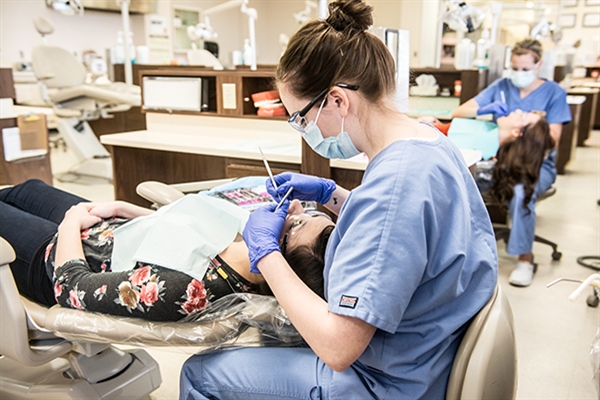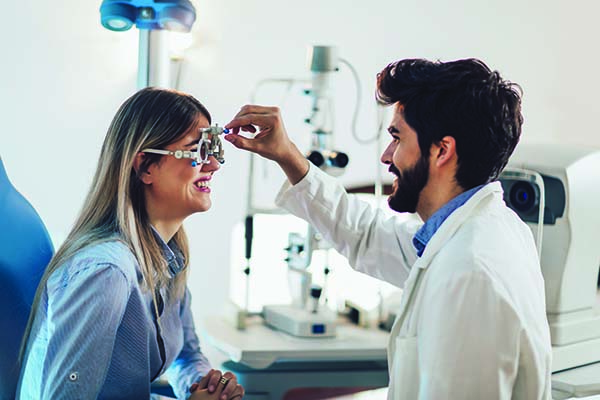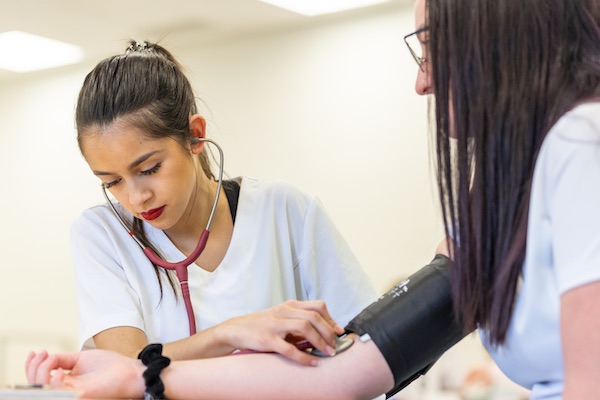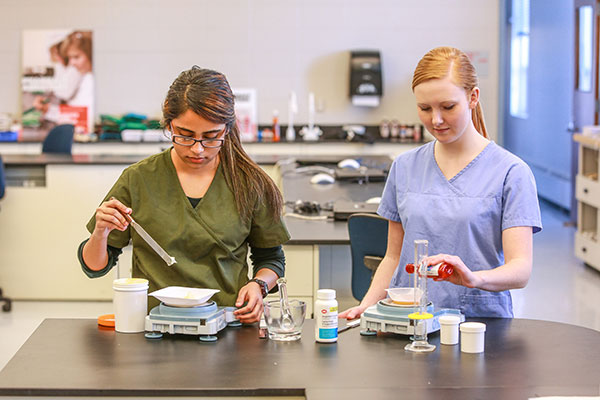On this page:
Overview
Dental assistants are key players in the dental health team.
Our Dental Assisting program emphasizes patient-centered practices to enhance oral health and well-being and is tailored to ensure you're ready to work in various settings, including private practices, specialist offices, and community health centers.
In this program, you will:
- learn the principles of providing compassionate care that respects the individual needs of patients
- learn how to perform intra and extra-oral imaging
- perform laboratory procedures
- learn about infection prevention as well as control and safety protocols
- practice management skills.
You will combine classroom theory with hands-on learning in a dental clinic setting at SAIT campus, as well as complete a practicum to apply your dentistry assistant skills in a real-world dental office environment.
At graduation, you will emerge as a skilled dental assistant, ready to positively impact patient health and confidently step into your professional role to meet the demands of the dental industry.
Dental assistants tend to be methodical, social and objective.
You need:
- attention to detail
- fine motor skills
- the ability to put patients at ease
- good communication and people skills
- the ability to remain calm under pressure
- critical thinking skills
- the ability to be organized and manage time well
- to be comfortable sitting for long periods
- the ability to work as part of a team
- professionalism and the ability to regulate your emotions
- to be comfortable around human blood and tissue
- knowledge of disease transmission and infection control.
Dental assistants must wear personal protective equipment (PPE) for long periods. This includes tolerating latex and other disinfection chemicals.
Some dental assistants work extended hours and shifts, including nights and weekends.
You are strongly encouraged to refer to the ALIS website for career, learning, and employment information for dental assistants to ensure you can successfully meet the occupational requirements for the program and profession.
In this program, you will complete a required practicum in a dental office, where you will apply the skills you have learned in class in a real-world setting.
You will be assigned practicum placements with consideration given to your preference of location. However, due to limited availability in Calgary, it might be necessary for you to travel or relocate outside the city.
The healthcare field has a strong focus on health, wellness, and fitness to practice due to the demanding nature of the work and Occupational Health and Safety requirements. As such, special considerations will not be granted based on individual circumstances or preferences, except those stated as protected grounds when an accommodation has been approved.
In compliance with the practica agreements with our clinical partners, you will be required to provide specific documentation before you can participate in your practicum. Find out what requirements you need for this program.
Your pre-practicum requirements and dental health examinations are required by the first day of class.
This program is accredited by the Commission on Dental Accreditation of Canada.
You must write the National Dental Assisting Examining Board (NDAEB) exam to be registered in Alberta. Graduates are eligible to obtain a provisional licence upon completion of the program.
Upon successful completion of this program, you'll be awarded a SAIT Dental Assisting certificate.
Careers and opportunities
Each year, SAIT conducts a survey between February and April to determine the employment rate, salary and satisfaction of our newest SAIT alumni.
![]() 95% graduate employment rate
95% graduate employment rate
![]() $52,000 average starting salary
$52,000 average starting salary
Find out more about our graduate employment statistics >
Our graduates may work in the following occupations. Some careers require additional experience and education.
Associated National Occupational Classification (NOC) codes: 33100, 32111.

Career planning support
Unsure which career path is for you? Here are some recommended career planning resources to help you decide your future.
You can also head to Alberta alis for lots of information about careers in Alberta, including quizzes and labour market information to help you narrow down a path.
Finally, you can take our online career finder quiz, which can help narrow your options based on your current skills and interests.
Courses
The Dental Assisting certificate requires 40.5 credits (18 courses) to complete.
The program spans one year, with three semesters.
| Course | Credits |
|---|---|
|
Clinical Foundations provides an overview of the armamentarium and procedures for general operations of a dental office and the SAIT Dental Clinic. |
1.5 |
|
This course provides learners with theoretical knowledge and opportunities for developing the dexterity required to perform dental assisting preventive intra-oral skills. The theory component provides evidenced-based knowledge in preventive procedures, the etiology of dental diseases, patient education principles, anticarious agents, and desensitization in relation to patient assessment and the process of patient care. The laboratory component provides a solid clinical foundation for performing dental inspections, selective coronal polishing, full mouth probing, fluoride treatments, and the application of desensitizing agents. |
3 |
|
This course introduces the initial stages of a restorative dental procedure. Topics include the role of the dental assistant, pain control, isolation techniques, instrumentation, dental liners, bases, matrices, and wedges. These foundational skills will support students' ability to explore additional elements of restorative procedures in more depth subsequently in the program. |
3 |
|
This course presents the basic principles of pharmacology. Learners will develop the skills to accurately obtain and record vital signs, investigate health histories, and identify and manage medical emergencies common to the dental environment. In addition, learners will critically analyze, maintain, and accurately complete dental records and clinical charts. Legal and ethical professional codes of conduct are also discussed in relation to documentation and confidentiality. |
3 |
|
Throughout this course you will be exposed to the different specialty areas within dentistry. You will learn about the field of endodontics, which focuses on root canal treatments, pedodontics, which specializes in children's oral health, and orthodontics, which revolves around correcting dental misalignments. Additionally, you'll examine the vital aspects of public health dentistry, addressing community dental needs and the intricacies of special care in dentistry, catering to patients with unique oral health requirements. Pre-requisites:
|
1.5 |
|
This course introduces basic terminology related to the structures of the head, neck, and the oral cavity. Tooth structure, the function of dental tissues in health, and pathological conditions will be discussed. Learners will be provided with the opportunity to apply theory of the dental process of care in a lab setting. |
3 |
|
This course introduces procedures such as preliminary and final impressions, retraction cord techniques, skills required for the successful fabrication and placement of provisional prosthetic restorations, and the selection and application of final cements. Through a blend of theory and hands-on practice, students will become knowledgeable in dental laboratory equipment, materials, and safety protocols. Pre-requisites:
|
3 |
|
This course will provide clinical sessions for learners to develop competencies in assessment, implementation, and evaluation of preventive intra-oral services for patients. Learners will practice critical thinking skills in the application of patient history, clinical observations, oral health education, rubber cup polish, desensitizing, and fluoride treatments. A dental assisting plan for treatment will be completed in each session to adapt dental assisting care to the individual needs of the patient. Pre-requisites:
|
1.5 |
|
Practice Management provides an overview of dental office procedures and management skills with focus placed on assisting learners in developing skills required to be contributing members of a team. Topics will include conflict management, problem solving, decision making, developing patient/client relations, leadership and legal and ethical issues in the dental workplace. Pre-requisites:
|
3 |
|
Restorative Procedures 2 builds upon the basic restorative procedures covered in Restorative Procedures 1 and will introduce various types of restorative materials. Pre-requisites:
|
1.5 |
|
This course introduces assisting with removable prosthodontic procedures, and the fabrication of sports guards and whitening trays. Pre-requisites:
|
1.5 |
|
This course is a continuation of Dental Specialties 1 and provides additional knowledge of various disciplines of dentistry. The students will be exposed to periodontic and oral surgery procedures through supporting theory and clinical observation. Pre-requisites:
|
1.5 |
|
This course provides theory and clinical sessions for learners to attain competency in the application of enamel sealants. Learners will use various isolation techniques to apply sealants on mannequins and patients. Other topics include self-evaluation and patient education. Pre-requisites:
|
3 |
|
This course introduces the chain of infection, and methods to reduce the risk of transmission of microorganisms to healthcare providers and patients. Topics include immunization, routine practice, contact and droplet precautions, sterilization and disinfection, safety, and the Workplace Hazardous Materials Information System (WHMIS). |
1.5 |
|
This course covers the six essential nutrients found in foods, the anatomy of the digestive tract, factors that impact food choices, and will examine the relationship between nutrition and oral health. This course also discusses the promotion of nutrition as related to oral health, in community settings and among individuals. Pre-requisites:
|
1.5 |
|
DA Practicum provides learners with the opportunity to complete a four-week practicum in a dental office where they will apply their learning and skills in a dental setting. Focus will be placed upon patient-centered care and becoming practice ready. Pre-requisites:
|
3 |
|
This course presents theoretical considerations underlying dental radiologic practices. Techniques for exposing various radiographs and the processing and mountings of films will be covered. Emphasis will be placed on radiation hygiene and safety procedures. |
3 |
|
Dental Radiography 2 provides learners with an opportunity to develop competency and efficiency when providing radiographic services for clients in a clinical setting. Pre-requisites:
|
1.5 |
Progression
You must attain a PGPA and/or a CGPA of 2.0 or better each semester and pass the prerequisite courses to progress through the program.
To qualify for graduation, you must pass all courses, attain a CGPA of 2.0 or better and complete course requirements within the prescribed timelines.
Review our grading and progression procedure >

Explore your options!
Some courses in this program are available through Open Studies. You can complete courses via Open Studies to get a head start on your education, reduce your course load once accepted into a credentialed program, or determine which career path best suits you before you fully commit.
You may also take courses for general interest or personal and professional development.
Admission requirements
Applicants educated in Canada
All applicants must demonstrate English language proficiency and have passed the following course requirements or equivalents, with an overall average of at least 60%:
- Math 30-1 or Math 30-2, and
- English Language Arts 30-1 or English Language Arts 30-2, and
- Biology 30, and
- Chemistry 30.
SAIT accepts high school course equivalents for admission for applicants educated outside Alberta.
All applicants who were educated outside of Canada must demonstrate English language proficiency and provide proof they meet the program admission requirements outlined above with an international document assessment. Find accepted educational documents and assessment options.
SAIT may also accept courses completed at certain international post-secondary institutions.

Academic Upgrading
Missing an admission requirement for this program? Upgrade your prior education to help you receive admission into one of SAIT's career programs.

English language proficiency
All applicants must demonstrate English language proficiency prior to admission, including students educated in Canada.
Transfer agreements
At SAIT, we evaluate post-secondary credit you have previously earned and apply it to your SAIT credential. Explore our formal transfer agreements available for this program.
We can evaluate your prior education, even if we don't have a formal agreement in place.
Submit a transfer credit application
There are no formal transfer agreements currently in place for this program.
Transfer options for graduates
Build on the knowledge you’ve learned at SAIT. The opportunity to advance your education at an accredited post-secondary institution may be available.
🔗 Visit Transfer Alberta search tool for all transfer agreements in Alberta (including UCalgary, MRU and BVC).
If there are transfer agreements with other institutions outside of Alberta, nationally or internationally, they will be listed below.
Canadian Armed Forces
- Program name
- Dental Technician
- Available credits:
- n/a
If you are considering a future career in the Canadian Armed Forces, upon successful completion of this program, you may be eligible for advanced standing as a Dental Technician, subject to successful enrolment.
If you are accepted, you will receive subsidized tuition, books and academic equipment, in addition to a salary with benefits and a guaranteed job upon graduation.
Visit the Canadian Armed Forces for more information.
Available intakes
Spring 2025
Start dates:
- Domestic students: Waitlisted
-
-
Application deadline: April 30, 2025
-
- International students: Waitlisted
-
-
Application deadline: March 28, 2025
-
Fall 2025
Start dates:
- Domestic students: Closed
-
-
Application deadline:
-
Costs
2025/26 tuition and fees
The following estimated costs are effective as of July 1, 2025.
The estimated total cost of tuition and fees is based on the suggested schedule of study. Following a modified schedule will impact the fees you pay per semester and may alter final costs.
Domestic students
*You will be ineligible for the UPass during your third practicum semester.
The program total is based on the estimated amount you will pay if you enter this program during the 2025/26 academic year. The program total amount listed on your letter of admission may appear higher. This amount is your maximum tuition guarantee for the program. SAIT will not exceed this maximum, regardless of changes in tuition and fees between academic years.
*You will be ineligible for the UPass during your third practicum semester.
Books and supplies are approximately $1,000 - $1,500 per full-time year.
This is a bring-your-own-device program with a standard computer hardware and software requirement. See the specific requirements on our computers and laptops page. An Apple or Windows laptop is required, and tablets or phones are not suitable alternatives.
Find your booklist on the SAIT Bookstore's website. Booklists are created by semester and available approximately two weeks before classes begin.
Required personal protective equipment (PPE) and uniform
The industry-approved PPE and uniform you'll need will be discussed during your orientation. Depending on your requirements, these will cost $100 or more.
Dental assistants must wear safety glasses or face shields during dental procedures. Safety glasses must have solid side shields and cannot be regular prescription glasses. Prescription lenses can be placed in safety glass frames, or you can wear safety glasses which fit over prescription glasses or a face shield over safety glasses.
Additional fees
- A fee is associated with obtaining a police information check, including a vulnerable sector check, payable to the police or the Royal Canadian Mounted Police (RCMP).
- You must have your immunizations reviewed by the SAIT Health Clinic. There is a $75 charge to review vaccine history. Any vaccines you need to be administered will result in additional charges.
- A fee of approximately $50 to $100 is associated with an electronic student permit checking submission required for clinical practicum placements, payable to Synergy Gateway through the Verified software platform.
- Basic Life Support (BLS) Provider (Level C) CPR annual updates are required.
- You are responsible for additional expenses related to your practicum, including pre-practicum requirements and relocation costs to practicum sites outside of Calgary.
- The National Dental Assisting Examining Board exam fee is approximately $730. The annual dues of the College of Alberta Dental Assistants are approximately $300.

Financial aid
Paying for your education may feel overwhelming, but we have resources and programs that can help, including information about payment options, student loans, grants and scholarships.
This program is eligible for Canada Alberta Job Grant funding.
Application process
Ready to apply?
Follow our step-by-step guide to submitting a successful application.
Communication during admission
Email is the primary source of communication during the admission process. Ensure your personal email account is managed appropriately to receive our emails, files and communications.
We recommend you add hps.info@sait.ca domain to your safe senders' list or you risk missing critical email messages.

Begin your application
Apply now using the online application portal.
Ensure you have a valid Visa or Mastercard to pay the non-refundable application fee of $120 for domestic applicants or $175 for international applicants.
Information sessions
Prepare for a strong start in your chosen program or get the details to decide your future path.
Our expert staff and faculty are ready to answer your questions and provide information about the following:
- What sets SAIT apart
- An introduction to the program and area of study
- Admission requirements
- Future career paths
- Information on the earning potential and graduate employment rates.
Contact us
School of Health and Public Safety Advising
-
Email - hps.info@sait.ca
International Student Advising
-
Phone - 403.284.8852
-
Email - international@sait.ca
Subscribe for updates
Your journey starts here! Sign up to get important updates on:
- Health and medical programs
- Application information
- Relevant news and events

Oki, Âba wathtech, Danit'ada, Tawnshi, Hello.
SAIT is located on the traditional territories of the Niitsitapi (Blackfoot) and the people of Treaty 7 which includes the Siksika, the Piikani, the Kainai, the Tsuut’ina and the Îyârhe Nakoda of Bearspaw, Chiniki and Goodstoney.
We are situated in an area the Blackfoot tribes traditionally called Moh’kinsstis, where the Bow River meets the Elbow River. We now call it the city of Calgary, which is also home to the Métis Nation of Alberta.




